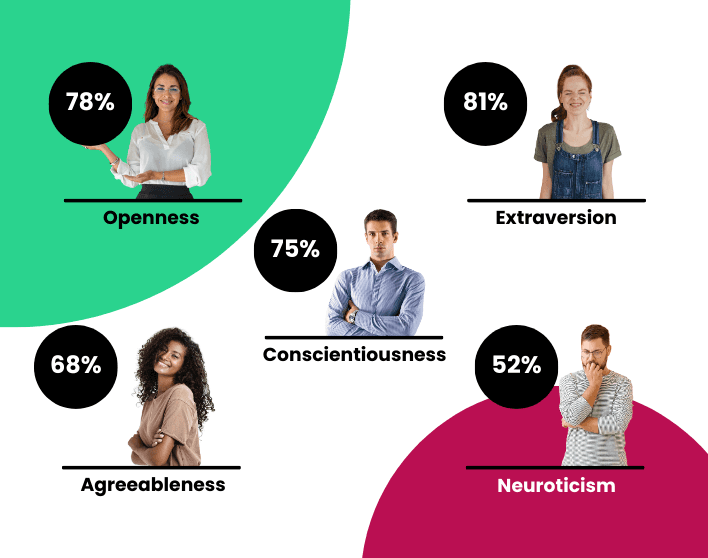The Bryq Team
HR Experts
Group interviews can be a great way of shortening the time the interview process takes you. However, they aren’t always easy to manage and facilitate. Read this guide to conducting group interviews to find out how to do it effectively.
Types of Group Interviews
There are two types of interviews commonly referred to as group interviews.
Panel Interview
Sometimes panel interviews are referred to as group interviews. This is more of a traditional interview where there are one interviewee and more than one interviewer. Often, the panel is made up of the hiring manager, HR representative, and perhaps someone who will be the colleague of the person getting hired.
Group Interview
A group interview is when there are multiple candidates in the room being screened. This is the type that is most often referred to as a group interview.
In this scenario, there is often more than one interviewer as you’ll usually have the hiring manager and HR representative there to assess the candidates, at the very least.
Keep in mind that many job candidates can be intimidated by group interviews. That’s because they are there with other people and it can feel like a contest. However, if you set up the interview right, you can put candidates at ease. This will help you to get a better gauge of whether they are a good fit for the role. The rest of this article will focus on the type of group interview when there is more than one candidate in the room.
Why Use Group Interviews?
Group interviews are not the most common thing to do during the recruitment process. So, why should you consider doing them?
Save yourself time – It can be tricky to weed out candidates when you have a number of highly qualified applicants. How can you differentiate between these people? It would be far too time-consuming to interview them all individually. Group interviews are an easy solution that allows you to meet a number of applicants at once.
Discover the personality of applicants – During a traditional interview, you don’t get to see the interviewee interact with others. In a group interview, you will see how they handle meeting and getting along with strangers. They will have to do this when they start working for you, so it’s a great insight into what they will be like to work with.
Performing under stress – Find out how candidates handle stressful situations. Most people find group interviews stressful, so this is a good chance to see how they manage stress. If the person performs well then you know that they can effectively cope in stressful situations.
Group Interview Tips
Here’s how you can set yourself up for success when running group interviews. Follow the below steps and make the process far easier for yourself.
Tell the Candidates
There is nothing more unsettling than walking into a job interview to find out you’re not the only candidate in the room. If you want the best from these people, you need to prepare them for the process. Otherwise, you may not get a true sense of who they are.
When you call them to invite them to the interview, make sure you mention that it’s a group interview and let them know what to expect. You will also want to follow up with an email that lets them know if there are multiple interviewers, who they are, and if a work simulation is involved.
Prepare
Prepare well for your group interview. This includes coming up with some excellent questions to ask the interviewees. Ask a range of behavioural and situational group interview questions to get a good idea of how the candidates react to different situations. This will give you insight into both past behaviours and how good they are at problem-solving.
Meet with the other panel members beforehand as well to go over questions and ensure you are all on the same page. It is a good idea to take turns asking questions. If you decide who asks what ahead of time, you will come across as more organized and professional in the interview.
Read Body Language
Body language is just as important as how these people answer questions. You can tell a lot about someone through body language. For example, how open and friendly they are to the others in the room. If the person leans forward when you are speaking, this is a form of active listening that shows that they are paying attention and interested in what you’re saying.
Greet Everyone
As the candidates enter the room, you should greet them and introduce yourself. The other panel members need to do the same. This will help to put the candidates at ease. Remember that their impression of you is just as important as your impression of them. So, make conversation as you wait for the other candidates to arrive. This is also a great way of finding out more about them in a relaxed manner.
Debrief
Once the group interviews are over, you will need to debrief with the rest of the panel. It is likely that you will have all come up with different insights into the interviewees. By seeing how the rest of your panel felt about the candidates, you can come up with a shortlist of candidates for the next stage of the process.
Don’t skip this step, as it is extremely useful to find out where your opinions line up or differ on your impressions of the candidates. Do this as soon as you are available after the group interviews, while you still remember the details of everything.
After this, you will likely do traditional interviews with your shortlist of candidates. The group interviews will be useful for cutting this down to a manageable list. During the traditional interview, make sure that you ask different questions. This is a chance to go more in-depth with the candidates you have chosen, now that you know what they are like in a group environment.









